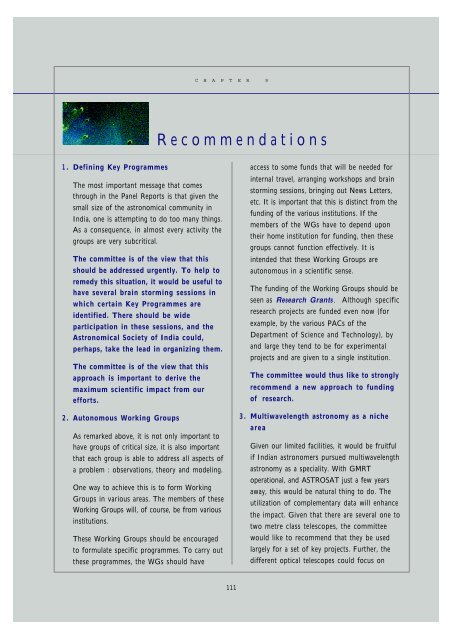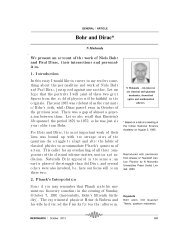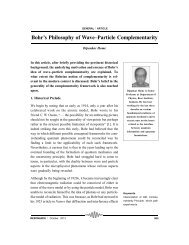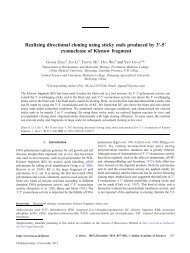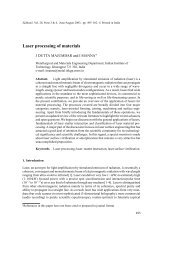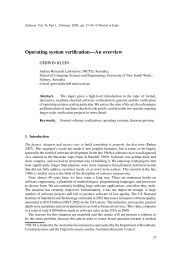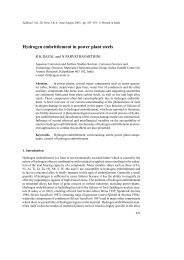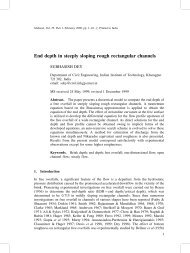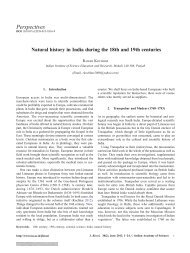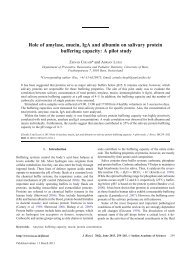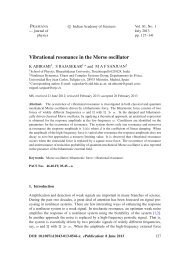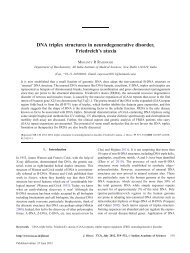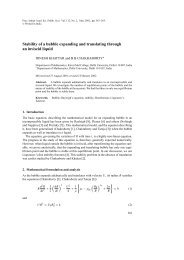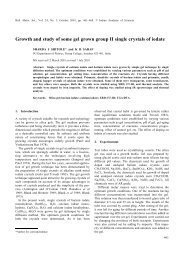2004 ASTRONOMY & ASTROPHYSICS - Indian Academy of Sciences
2004 ASTRONOMY & ASTROPHYSICS - Indian Academy of Sciences
2004 ASTRONOMY & ASTROPHYSICS - Indian Academy of Sciences
Create successful ePaper yourself
Turn your PDF publications into a flip-book with our unique Google optimized e-Paper software.
CHAPTER 9<br />
Recommendations<br />
1. Defining Key Programmes<br />
The most important message that comes<br />
through in the Panel Reports is that given the<br />
small size <strong>of</strong> the astronomical community in<br />
India, one is attempting to do too many things.<br />
As a consequence, in almost every activity the<br />
groups are very subcritical.<br />
The committee is <strong>of</strong> the view that this<br />
should be addressed urgently. To help to<br />
remedy this situation, it would be useful to<br />
have several brain storming sessions in<br />
which certain Key Programmes are<br />
identified. There should be wide<br />
participation in these sessions, and the<br />
Astronomical Society <strong>of</strong> India could,<br />
perhaps, take the lead in organizing them.<br />
The committee is <strong>of</strong> the view that this<br />
approach is important to derive the<br />
maximum scientific impact from our<br />
efforts.<br />
2. Autonomous Working Groups<br />
As remarked above, it is not only important to<br />
have groups <strong>of</strong> critical size, it is also important<br />
that each group is able to address all aspects <strong>of</strong><br />
a problem : observations, theory and modeling.<br />
One way to achieve this is to form Working<br />
Groups in various areas. The members <strong>of</strong> these<br />
Working Groups will, <strong>of</strong> course, be from various<br />
institutions.<br />
These Working Groups should be encouraged<br />
to formulate specific programmes. To carry out<br />
these programmes, the WGs should have<br />
access to some funds that will be needed for<br />
internal travel, arranging workshops and brain<br />
storming sessions, bringing out News Letters,<br />
etc. It is important that this is distinct from the<br />
funding <strong>of</strong> the various institutions. If the<br />
members <strong>of</strong> the WGs have to depend upon<br />
their home institution for funding, then these<br />
groups cannot function effectively. It is<br />
intended that these Working Groups are<br />
autonomous in a scientific sense.<br />
The funding <strong>of</strong> the Working Groups should be<br />
seen as Research Grants. Although specific<br />
research projects are funded even now (for<br />
example, by the various PACs <strong>of</strong> the<br />
Department <strong>of</strong> Science and Technology), by<br />
and large they tend to be for experimental<br />
projects and are given to a single institution.<br />
The committee would thus like to strongly<br />
recommend a new approach to funding<br />
<strong>of</strong> research.<br />
3. Multiwavelength astronomy as a niche<br />
area<br />
Given our limited facilities, it would be fruitful<br />
if <strong>Indian</strong> astronomers pursued multiwavelength<br />
astronomy as a speciality. With GMRT<br />
operational, and ASTROSAT just a few years<br />
away, this would be natural thing to do. The<br />
utilization <strong>of</strong> complementary data will enhance<br />
the impact. Given that there are several one to<br />
two metre class telescopes, the committee<br />
would like to recommend that they be used<br />
largely for a set <strong>of</strong> key projects. Further, the<br />
different optical telescopes could focus on<br />
111


